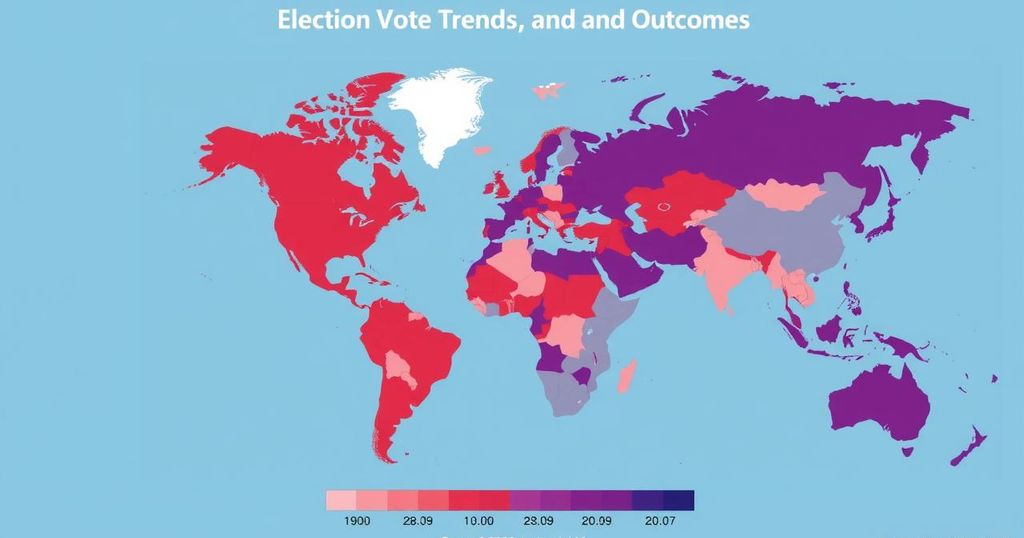Reflections on the Global Democratic Landscape After the 2024 Elections

In 2024, over 60 countries, representing nearly half the global population, participated in landmark elections. Results indicated a tendency for voters to prioritize personal interests amidst economic concerns, affecting established leaders like Biden and Modi. Notably, authoritarian practices were highlighted in Russia, emphasizing the disparities in democratic engagement worldwide. Collectively, these elections reflected both a commitment to democratic processes and significant ideological challenges ahead for global governance.
In 2024, the world witnessed an unprecedented democratic phenomenon as over 60 countries, representing nearly half of the global population, participated in elections. This marked a significant milestone in the evolution of democracy, showcasing a collective effort toward self-governance. However, the election outcomes reflected a concerning trend: many voters prioritized immediate personal interests over collective wellbeing, driven by fear and economic anxieties.
In numerous industrialized nations, such as the United Kingdom, pressing economic issues, predominantly food security, overshadowed long-term concerns like climate change. The Labour Party, led by Keir Starmer, secured a substantial victory due to voter discontent with the Conservative Party following years of economic struggle. Furthermore, global leaders such as United States President Joe Biden faced setbacks, as voters dissatisfied with inflation and stagnant wages turned to alternative candidates like Donald Trump.
As elections unfolded throughout the year, incumbents faced a wave of criticism and penalties, highlighting a widespread trend of voters responding to economic hardships by punishing sitting officials. Significant electoral shifts were observed in democracies from India to South Africa, where established parties lost ground to both populists and newcomers. Notably, Trump’s rise and Macron’s challenges in France exemplify a global reorientation toward populist sentiments amid economic turmoil.
In stark contrast, the Russian election underscored the perversion of democratic ideals, with Vladimir Putin’s overwhelming vote share serving as a stark reminder of the absence of true democratic practices in authoritarian regimes. The implications of these results are profound, particularly regarding the geopolitical landscape and the potential impacts on democracies struggling under oppressive circumstances, such as Ukraine.
In essence, the 2024 elections reflect a dual narrative: a burgeoning embrace of democratic processes in diverse global contexts coupled with persistent challenges in maintaining true democratic values amidst populism and economic despair. As nations navigate these complexities, the lessons of participatory governance continue to unfold, offering a narrative rich in both hope and caution.
The 2024 elections were significant not only for their scale but also for the lessons they imparted regarding voter behavior and the state of democracy globally. With nearly half the world’s population casting votes, this unprecedented level of electoral engagement provided a unique opportunity to analyze how different nations responded to both personal and collective challenges. The backdrop of economic instability created a fertile ground for populist movements and significant shifts in political power, raising questions about the future trajectory of governance worldwide. Moreover, the contrast between countries like the United States and more authoritarian regimes, such as Russia, illuminated stark differences in how democracy is defined and enacted. This juxtaposition allowed observers to reflect on the true essence of democratic participation and the ongoing struggle for freedom and representation in many parts of the world.
In conclusion, the electoral landscape of 2024 has laid bare the complexities and challenges of modern democracy. While many nations embraced the opportunity to vote, the prevailing trends indicate a worrying inclination towards self-interest over collective governance. The events of this year serve as a crucial reminder that democracy is a delicate balance of power, economy, and the will of the people. As the world moves forward, the lessons gleaned from these elections will be vital in shaping future democratic practices and addressing the ongoing struggles for equity and representation.
Original Source: www.cnn.com






